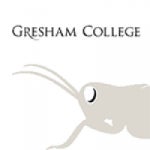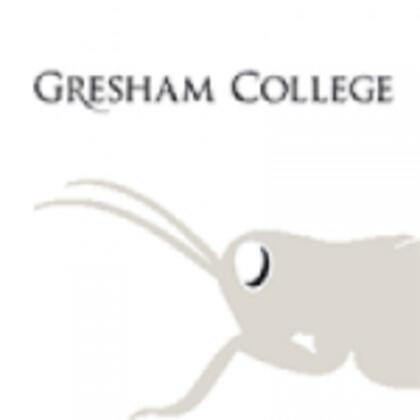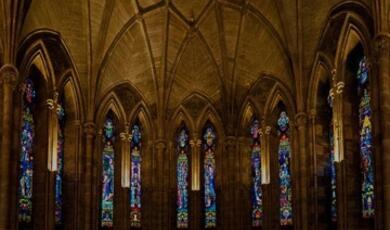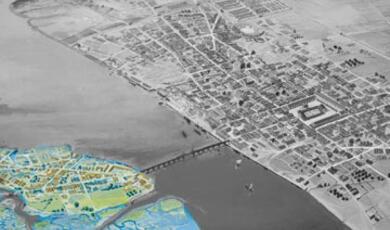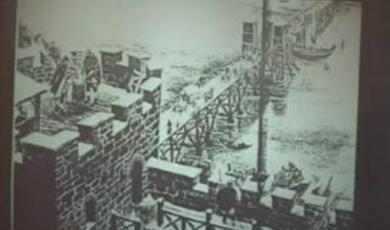Rich and Learn'd: the library of Gresham College
Share
- Details
- Text
- Audio
- Downloads
- Extra Reading
Irene Gilchrist, archivist at the Guildhall Library, explores in this lecture the history of the Library. The original Library at Guildhall was founded in the 1420s under the terms of the will of Richard Whittington. Today it is a major public reference library which specialises in the history of London, especially the City, as well as having other significant collections. The Library holds many interesting documents from the early days of Gresham College.
Download Text
RICH AND LEARN'D: THE LIBRARY OF GRESHAM COLLEGE
Irene Gilchrist
I have to say, when I got up this morning and saw what the weather was like, I thought 'Great, nobody is going to come - it will be like an 18thCentury lecture where an eminent academic turned up, expecting to find the twelve o'clock lecture in Latin, to be told, 'Oh no, we never have that - nobody ever comes for it!'' but welcome on behalf of the Gresham College Library.
One of the great joys, certainly for me and I think for many of us working in the City, living in London, are the many hidden treasures that are around. There is everything from Gresham College itself, wonderful pubs, small plaques on the wall commemorating events, churches, the chapel in Mercers Hall itself - a whole variety of things, but it was quite clear last year, when Barbara Anderson visited Guildhall Library, that a lot of people were unaware of yet another of the City's treasures - the Gresham College Library. Barbara said, 'Well, I think we should organise a do around this. It would make a good lecture, and we could perhaps have an evening exhibition as well.' At the time, I said, 'Oh yes, what a good idea!' forgetting of course that I would eventually have to deliver! I was then faced with the problem of how to deal with something as interesting, but hidden in many ways, as the Gresham College Library.
There are the professional issues. Libraries and librarians don't actually have the world's best image. I don't know whether we have never been able to afford to employ the best public relations people, or whether it's just that it's a profession that attracts a certain type of person. A very distinguished colleague said some years ago that 'Librarians are a group of people who have had a charisma bypass operation.' Now, that may be true, but I am delighted to say that it's not true of their collections, and it certainly is not true of the Gresham College Library, which is interesting, eclectic, eccentric, and valuable. I should say that the 'Rich and Learn'd' description applies not to me, generous though the City of London is as an employer, but I am neither learn'd nor rich; the description is of the Library. But how do you project what a library is about? Should I turn up with a PowerPoint presentation showing wonderful slides of books, manuscripts, pictures? I thought not because what I wanted to do today was to encourage people actually to use the resources of Gresham College Library to value them for themselves, and also to encourage, and I have to speak selfishly as I come from Guildhall Library, to encourage people to use the enormous resource that is Guildhall Library.
I also had a personal problem in talking about the Gresham College Library. My association with Gresham College actually goes back to my student days in the '60s, and it was two-fold. We had a Professor of Music at King's College, where I was, Thurston Dart, known to be an enormously talented and interesting keyboard player, but the first thing he did was to install his harpsichord in the college chapel at King's and label it 'Cursed be he who touches me'. So I had my first contact with someone associated with Gresham College, because Thurston Dart was indeed a Gresham Professor of Music at the time, was a little bit forbidding. It got worse.
The unfortunate soul who was instructed to teach me New Testament Greek was the Reverend Dr Gordon Hulin. Dr Hulin was small, acidic, academic, and actually, under it all, incredibly kind, but in my first year, I encountered Dr Hulin in a New Testament Greek class and he said, 'Miss Gilchrist, your turn to read!' Now, I had done no classical Greek at school but I had spent six months in Athens as an au pair in a gap year, so I read Greek pretty fluently. So I set off at a great pace reading the Gospel of Mark but with a Modern Greek accent. Dr Hulin looked at me and said, 'Miss Gilchrist, that and you are both aberrations!'
So I stand here as an aberration. I am not an academic. Even as a librarian, I am not particularly a specialist, and I suppose, in some ways, that makes me the right person, in a very strange, contradictory way, to talk about the Gresham College Library.
If you, like Queen Mary, looked at my heart on burial or cremation, it would probably say 'South Asia'. My basic interests are probably around India, the British in India, and particularly women in India. So, for me, when I joined the staff of Guildhall Library, they too actually viewed me as an aberration. I had just worked in Asia twice in the prior ten years and they did not view that as particularly helpful, but I went to work for the most amazing collection relating to London history. But set in that, I discovered some of the finest and the rarest travel books - including books on Nepal, India - all belonging to Gresham College, an institution with which, at that time, I had absolutely no direct connection, but it has grown over the years. I retire next month, and one of my pleasures will be that I get more time to actually spend in the lectures at Gresham College.
I decided that there should be no PowerPoint presentation because what mattered were the books, and books don't come over at their best in slides and pictures. Books are not museum pieces. They were made for people. They are made to be handled, used, and looked at. Of course there are preservation issues, and if something's very frail or very rare there have to be restrictions, but nevertheless, I do not approve of the concept of a library as a museum, so I didn't approve of the concept of a library as a slideshow or a PowerPoint presentation either. I am glad that many of you have actually signed up to come to Guildhall Library this evening, when you will be able to see some of the Library treasures and certainly some of the material from Gresham College. So I decided that what I would do would be to do an informal ramble around the subject at lunchtime, perhaps more of a sandwich lunch than a three-course meal. But, if I think of the people who've lectured to Gresham College, then I feel really rather humble.
The purpose of the lecture, obviously, is to publicise and to encourage people to think about the Gresham College Library, its manuscripts and its books, and the archives, but it's also to celebrate the Guildhall Library's partnership with Gresham College. These two institutions, with the support of the Mercers' Company, have been looking after, in their own ways, the Gresham College Library since the 19th Century, and I think that's something to be celebrated. We are all told to look for partners, but of course, if I am honest, we actually have them already. What we need to do, perhaps, is to make better use of each other.
I was preparing for this lecture, obviously, by re-reading the book without which you cannot have any connection with Gresham College, the history by Richard Chartres and David Vermont, two very special people, who have written a very good book. I have to say, if I had been consulted at the time, the only thing more I would have wanted would have been an index. I actually had to read it to find what I wanted... but I am a librarian!
But it occurred to me that there are things which Gresham College and Guildhall Library, which is where the library of the College now is, have in common, and that is that we are both great survivors. Re-reading the story of Gresham College, it is quite amazing that we are all sitting here today in a beautiful building, because the attempts to get rid of the College, to cut its budget and to use its money for other things, make really quite shocking reading.
Guildhall Library itself of course has had a slightly chequered history. When I go and talk to family history societies I say very grandly, 'Of course, the Guildhall Library is a medieval foundation.' Actually, technically, that's a lie. There was indeed a wonderful medieval library at Guildhall. It was founded in the years 1423 to 1425, with money left by two great City men, William Berry and the better-known Richard Whittington, although I think most of us know Richard Whittington perhaps rather better not for his charitable deeds and being Lord Mayor, but for his pantomime appearance with his cat. But, the original library at Guildhall was wonderful. Like the Gresham professors, the Guildhall librarian actually was provided with lodgings, so there was at Guildhall a house and garden, which belonged to the medieval Guildhall librarian. Nowadays, like any other office, we have to fight even for a space to put our desk and chair, but in those days, my post would probably have had a rather nice cottage and garden, actually in Guildhall yard. If you think of it in property value terms, it is absolutely stunning.
The Library survived and flourished, and it had the great advantage of being open to anyone who could read. It was of course a library of manuscripts at that date, all of which were chained - which is another thing that librarians love. Can you imagine? 'No, you can't borrow this book - it's chained to the shelf!' You can't steal it either, even better! Absolutely wonderful for the librarian!
But in 1549, the Corporation of London was then negotiating with Protector Somerset, and when he decided that he needed a library for his new house and sent a whole series of horses and carts to Guildhall to take away the library to decorate his house, the City actually did nothing about it. Gresham College is rather better actually - it managed at least to sort of survive - but Guildhall Library essentially vanished between 1549 and the 1820s.
It says a lot, I think, for the London public that, in the 1820s, there was a petition for there to be a new library at Guildhall. It came slowly but the Guildhall Library was eventually opened in a small series of rooms in the porch at Guildhall. If you stand in Guildhall Yard and look towards the old part, in the George Dance porch, there are some rooms at the top, and that's where the library was. It was bit like a gentlemen's club, because it was fitted out with armchairs and chairs and was intended, at that stage, for members of the Court of Common Counsel, aldermen, and for the officers, i.e. the senior employees of the City of London.
It stayed that way until about the mid-1850s, when it was decided that you could take the risk of inviting people, by reader's tickets, so it was a little bit like the modern British Library. We, I say grandly, finally went public in 1872, and in 1874, the magnificent new Victorian Gothic Library opened on the East side of Guildhall, currently closed at the moment for renovation, but used for receptions, because in 1974, we moved into modern premises in the West Wing, which is where tonight's reception is being held if you're coming. Alas, our collections are charismatic but our building, I am afraid, is 1970s concrete and glass - I apologise.
The association between Guildhall Library and Gresham College started really in the mid-19th Century. Looking at the history of Gresham College, Tim Connell mentioned the fact that the library is now with Guildhall Library. I think it's true to say that it's probably not the same library. It's one of the subjects on which I have to do a lot more research, but it looks as if, at some point in the College's history, there must have been a very active library. I cannot believe that you could have a house full of Gresham professors in the 16th Century and not have a library, but at some point it vanished, perhaps slowly.
In 1838, the Gresham Professor of Music was a singer called Edward Taylor, a bass if it's of interest to anybody, and he decided that there should be, for London, a music library. He wrote an impassioned plea asking for money and books to found a music library at Gresham College. He acknowledged that he hardly had the building to put it in, he had no resources, but he said it was a disgrace that there was no library for music, for musicians and scholars, or for historians to see how music had changed and altered, in London. He launched his appeal, and it was very clever, because he launched his appeal and said, 'And we've already been given a book by Queen Victoria,' and so the appeal got underway, and there were an increasing number of books.
Looking at the Gresham College Collection, you can see that the original letters of donation have been kept in many of the volumes, so people wrote and said, 'I am sending you this book of glees,' or 'I am sending you various manuscripts.' They were slowly catalogued. It is interesting that through the 19th Century, you see various pleas for money to create a proper catalogue, so the College obviously took its responsibilities very seriously. Not only did they want this material, but they were prepared certainly to look after it properly.
There were donations from the Musical Antiquarian Society in 1842, and the wonderfully named Sacred Harmonic Society. We somehow don't manage to have names with such a resonance these days, I think. So the College collection of music and manuscripts grew.
There was, as I mentioned I think, a need for money. They appealed for money for a bookcase in 1848. In 1851, they actually lettered the volumes, presumably to make it quite clear that they belonged to Gresham College, and then a bit later, in 1855, some of the books needed repair and rebinding, and so the vast sum of £10 was given for that.
If you're coming this evening, you will see some of the catalogues that were created. We tend to think these days obviously of card catalogues, or even online catalogues, but at that time of course, your catalogue was a printed one, and in some cases too, we have the original typescript, with pencil annotations, which are quite interesting to look at.
But it is true that the collection stayed very much focused on music - music theory, actual music, and music practice - until, in 1871, the College was offered a collection of books by Leticia Hollier, who lived in Greenwich, and she was holding a very large collection of pictures, books and manuscripts which had belonged to her husband. On her death, she had asked that her solicitors should offer them to Gresham College. The solicitor describes them thus: 'The pictures are about forty in number, of various qualities. Some of them are valuable, but many are inferior. The books consist of about 1,200 volumes, and I have reason to believe that many of them are valuable and all of them are good.' And so that collection came to Gresham College.
In 1872, there was a catalogue listing made, and it is fascinating, because it brought to Gresham College a collection of breadth and depth which reflected far more the interests of the College. There is travel material, mathematics, bibles, there is some architecture, astronomy, the full range that you would expect in a good academic library, and it is that which forms the basis, and I think the importance, of the library that survives today.
At that stage, Guildhall Library seems to have provided only advice and support. The librarian was several times summoned by the Gresham Grand Committee and ordered to produce a catalogue. Looking very carefully, it is quite clear that on occasions the instruction was ignored. Other times, a new catalogue was made. But the care of the collection seems to have slipped a little bit from the priority either of the College or indeed the Mercers? Company, who provided much of the money, through the end and the beginning of the 20th Century.
Many major libraries, as you know, suffered a very serious loss of their books during - in some cases, during the First War, but mostly during the Second World War. Guildhall Library was one of them, but Gresham College Library appears to have survived the War.
The cooperation between the Library and the College continues, and I was fascinated to note that in 1950, Guildhall Library transferred to Gresham College a whole load of what sounds like rather clapped out office furniture, presumably as a gift, including such things as one pound ten shillings worth of steel wastepaper bins, but quite a lot of equipment for a library, including periodical boxes, filing cabinets, catalogue card drawers, so it's quite clear, although the minutes are not explicit in this case, that the College was struggling to maintain its library and making every effort to do so.
However, when it came to 1958, the College decided that it could no longer look after its own library, and it asked that the Guildhall Library should take it on. Guildhall Library was still, in the '50s, was very much a library of London Middlesex history. There was a certain amount of other material, and there was a fairly active business collection, then the Commercial Reference Room, now the City Business Library, and reading between the lines, although the Gresham College Library was viewed as incredibly valuable, it is quite clear that some of my predecessors were slightly challenged by the contents of the Gresham College Collection. But I am delighted to say, they agreed to take it on, and it brought to Guildhall Library a selection of subject matter and books that it would never otherwise have had.
It is true that Guildhall Library does have some early, rare material, but the Gresham College Collection certainly outweighs it in certain subject areas. Music is very poorly represented in Guildhall Library, but that which came with Gresham College is absolutely stunning! There is everything from a Purcell manuscript to a Thomas Tallis manuscript. It was clear that, for the ordinary cataloguers at Guildhall Library, this was a challenge too far, and so a specialist was brought in to produce a special catalogue of the Gresham College music collection, which is still available, and if anyone would like a copy, they can have a word with me or see me this evening and I will be very happy for you to have one.
But the music catalogue actually brought to Guildhall Library quite a lot of interest, and still, to this day, there are people who come to Guildhall Library only because of the Gresham music collection. Academics from all over the world ask for microfilms, and sometimes even family historians or descendents of the musicians will photograph or write about the music collection. What I think is slightly less obvious at Guildhall Library are the other books, and that may be because we haven't done enough to celebrate their existence.
Certainly, looking at the history of printing of bibles, for example, we would not be able to put on a very interesting exhibition without the innumerable bibles which exist in the Gresham College Collection, and some of them will be on display this evening.
I have always had a great affection for the Gresham College Library. It is one of our very special collections, and though it makes us sound a bit like the Battersea Dogs' Home, we have always taken in the homeless collection, but only if it's been viewed as relevant and pertinent. I think we went through a period after the War when, having lost quite a lot of material, we took anything we were given, so I recently withdrew from the collection a book on birds of West Africa, which didn't fit terribly well with London Middlesex, but had been given to us by the Midland Bank shortly after the Second World War. I may say, it didn't go in a skip but went to the Zoological Society, who were delighted to have it for their Library.
But now, in 2007, and I think the time has come not only for us to celebrate the glories of the Gresham College Library, but also to think where it should go and what should happen in the future. I see no reason to believe that Guildhall Library itself will come to an end. There is absolutely no wish to get rid of any of our rare book collections - that's not the issue. But a few years ago, we looked at the Gresham College Collection in great detail. Some of it needs attention by dint of its age or the way it was put together. For example, some of our manuscripts were written in what's called iron gall ink. This is a highly acidic ink, which eats its way through the paper, so you start out with a document which is clearly written, and a few hundred years later, what you have is a series of holes, or at best, some rather smudgy writing, and we have examples of that.
The question arises, let us by all means publicise the Gresham College Library - I have been asked several times about a catalogue. It's actually included on the Guildhall Library Catalogue, and I can give you the website address for that later if you would like it, but there has been some suggestion that we might pull it together so that people can see what actually belongs to Gresham - a bit like an inventory, but a searchable inventory, for Guildhall Library. My IT colleagues are always very nervous about this, but I think it would work well in the case of Gresham College, with a good publishing tradition, and a lot of people who are interested not only in an individual item or whether it can be found, but in the library, the collection, almost as a sort of social historical statement. It's something we should think about.
But perhaps more importantly, we should think about where the Library is going to go in the future. I would like to see donations from Gresham Professors. Now, some have already been very generous. Libraries should not be dead. Libraries can be living. The Gresham College Library had almost nothing added to it for forty years, between 1958 and probably just a few years ago, but there was a great clear-out in one of the offices here, and a shelf of otherwise unwanted books were discovered, brought to Guildhall, added to the Gresham College Library, and they are fascinating biographies that we do not have otherwise and they have proved to be very successful. So should we think about encouraging people to donate books to the Library?
But we also need, I think, to face the question that what we have now won't exist for people who come after us unless we do everything we can to preserve it. Much of the Gresham College Library is in very good condition, but like the rest of us, it suffers a bit from old age. So one of the things we need to do is to think about the issues of long term preservation and conservation. I know that there is a strong argument for digitisation, and I am someone who is very much in favour of digitisation, because it disseminates information, lets people look at things who have no chance at all of doing so in person, but there is no substitute for the real item, and the joy of touching... I was looking at the Robert Hook diary yesterday, and the sheer pleasure of touching something that old, which had been looked at, used and written by someone that important, is something that absolutely nothing can replace. Alas, if you're coming this evening, the Hooke diary will be out but can't be handled because we're having food and drink, and the two are not a happy partnership.
A few years ago, my conservator colleagues did a survey of the Gresham College Library, and it was quite clear that at that time we probably needed to think about £25,000 worth of conservation work, if it was to be put into the condition that I think Gresham College deserves for its Library. But there has to be a balance, and one of the things we are hoping to do, leading on from today, is to decide whether we should raise money, how we should do it, and I hope that out of today and this evening will come an informed debate on the future of the Library. Should it be expanded? How should it be expanded? What of the original should be kept? It is a very interesting social statement, the Gresham College Library. It should be preserved, but 'how?' is the question.
It is reasonably secure: it is in the sub-basement in Guildhall Library, which isn't charismatic but it is air conditioned and secure. Anyone can come in and, with one or two exceptions, can ask to see anything and we produce them normally within ten minutes. But nevertheless, it can sometimes be hard to persuade people the value of something that they can't actually see in beautiful wooden bookcases.
So these are the questions that face the Gresham College collection at the Guildhall Library.
©Irene Gilchrist, Gresham College, 20 March 2007
This event was on Tue, 20 Mar 2007
Support Gresham
Gresham College has offered an outstanding education to the public free of charge for over 400 years. Today, Gresham College plays an important role in fostering a love of learning and a greater understanding of ourselves and the world around us. Your donation will help to widen our reach and to broaden our audience, allowing more people to benefit from a high-quality education from some of the brightest minds.


 Login
Login
